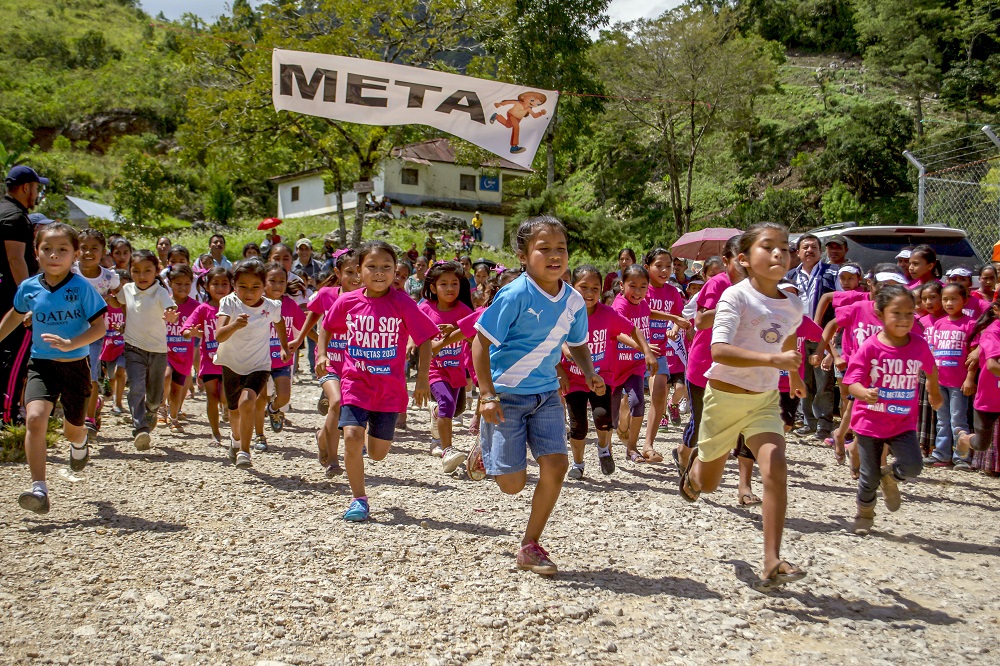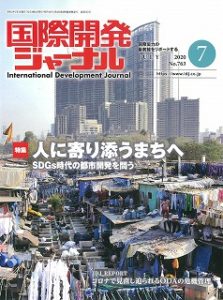Japanese NGOs face a COVID-19 dilemma - The challenge is to secure funds and flexible scheme
IDJ ENGLISH International Development Journal 2020 June edition
Due to the spread of COVID-19, not only official development assistance (ODA) but also the activities of international cooperation NGOs have been suspended. If this continues, the poor and vulnerable assisted by those NGOs in developing countries will face even more adversity. NGOs are aiming to resume their activities as soon as possible while developing new support systems to prevent infections, but they also face a complicated dilemma.
Postponing or canceling of new projects
As of early May, immigration restrictions and lockdowns have been implemented one after another in developing countries to prevent the spread of COVID-19 infections. As a consequence, aid-related people have been unable to carry out local activities or travel to their sites in developing countries. NGOs are no exception.
In Indonesia, which is headquartered by NGO Kopernik, that works on the development and dissemination of technology aimed at poverty reduction in the “Last Mile” region - the most unreachable in developing countries - lockdown measures have been adopted throughout the country. There is a situation wherein it is impossible to move, even on a business trip. “We're switching existing projects to what we can do online but, in the months to come, there might be almost nothing that we can do online,” said Kopernik co-founder and CEO, Toshihiro Nakamura. Some new projects are already postponed or canceled due to COVID-19.
“If this situation continues for a few more months, the poor will die,” said an NGO employee in Uganda. The whole country has been locked down since March 30th. The period was originally planned for two weeks, but has been extended. Except for shopping for groceries and daily necessities, in principle, going outside is prohibited. If people go out without permission, they may be arrested. Food prices are soaring, food is becoming more difficult to buy, and violence and theft of foodstuffs is occurring in the capital city, Kampala, raising security concerns.
Under such circumstances, stores and restaurants, including cafes run by HIV-positive single mothers, have lost customers and are on the verge of closure. At these stores, the AIDS orphan-supporting Japanese NGO, PLAS (Tokyo), provides management know-how, which supports livelihood improvement and life planning for poor families with children who have lost one or both parents due to HIV/AIDS. PLAS is becoming increasingly seriously concerned that not only continuous support but also the livelihood of the support recipient will be threatened further.
JPF supports the continuation of the current projects
Japan Platform (JPF), an international humanitarian organization that has supported NGOs for many years, takes this situation very seriously and has launched a response policy for COVID-19. JPF, which is a framework for collaboration and cooperation between NGOs, business circles, and the Ministry of Foreign Affairs, utilizing Japanese government funds and donations collected from companies and individuals to support the activities of NGOs that provide emergency humanitarian assistance.
The response policy is to ensure that NGOs can continue their current projects as much as possible while ensuring maximum safety so that the humanitarian crisis of the most vulnerable that NGOs have been working on do not worsen. It also suggests that flexible measures will be taken according to the situation. They plan to flexibly operate the response policy, making revisions while checking the situation. As of May 8, there are two main points regarding the operational policy.
First, it is a response to the continuation of the current projects. Due to the spread of infection, NGOs are faced with the need to add new efforts and make major changes not included in the original plan, such as distributing masks and disinfectants to local staff, and holding workshops on infection prevention, such as hand washing.
Furthermore, it is expected that the originally planned scope and number of beneficiaries will change as the plan is changed or extended. JPF will accept plan changes within the budget amount at the start of the project.
Also, regarding the “completion report” to be submitted at the end of each project, if the original of the termination report cannot be submitted due to the difficult postal circumstances or the work system, or if an accounting audit using the original is not possible, the omission of the seal or electronically received data correspondence will be accepted. (The original document must be submitted as soon as possible).
Next is information sharing when the NGO has a positive case of COVID-19 among their staff. Conventionally, when an incident or accident happens, the NGO side decides whether or not reporting to JPF is necessary and responds. It is said that the NGO side will decide whether to report the positive corona cases. If there is a report to JPF, they will do their utmost to protect private information.
In addition, JPF has already started accepting applications, as it is subsidizing new projects on a conventional scale. “Because of the COVID-19 disaster, we must prevent the existing humanitarian crisis from worsening. We want to respond to necessary projects with a sense of speed,” said Hiroaki Higuchi, Director of the JPF Grant Promotion Department.
However, challenges remain. One of them is fundraising, which seeks donations from the private sector. Normally, the JPF is able to cover most of the funds needed to support victims of natural disasters that occur in Japan, only through private donations from companies.
This time, in the scheme “COVID-19 Emergency Support”, newly established by JPF in February, they have been struggling in terms of fundraising. As companies, the purse strings for donations will never be loose. In particular, there are many companies that are considering making donations with the condition that they are limited to domestic support.
This has been pointed out by other NGOs. There are many companies and investors who raise their hands on investment and donation for the COVID-19 countermeasures in Japan. But it will decrease for international cooperation. “Even if you look at the scheme of the newly established subsidies, many of them are only for the COVID-19 countermeasures in Japan. Our overseas projects do not apply to the application conditions,” a staff of an international cooperation NGO says.
Despite that, “I want to deliver support to the local people as soon as possible,” said PLAS Representative Director, Ruiko Monda, who decided to use her own funds for emergency humanitarian assistance. They distribute food and hygiene products such as soap in Uganda and Kenya. Currently, she said that she would collect donations through crowdfunding and later cover her own funds.
Considering schemes other than ODA
On the other hand, Kopernik has started to locally support the COVID-19 countermeasures by utilizing public and private funds abroad. The organization is currently working with the assistance of the Australian Department of Foreign Affairs and Trade (DFAT) on the development and production of face shields for Indonesian healthcare workers. The funding for this project comes from the Australian crisis response fund, which provides funding in the event of a natural disaster. “The government has been working on the creation of this Crisis Response Fund and the formation of an organization that can respond quickly to emergencies for the past five years. This has been working well for COVID-19,” Nakamura points out.
In addition, since the spread of COVID-19 infection causes damage equal to a “disaster”, non-official development assistance (ODA), including budget for promoting multilateral disaster prevention cooperation in the Asian region, should be utilized. Why don't you consider using these funds?
In ODA as well, it is necessary to actively support Japanese NGOs so that they can exert grassroots power. Under such circumstances, it is necessary to consider how to incorporate the risk of new infectious diseases such as COVID-19 in the implementation of future projects. (Michi Sewaki)
*****以下、日本語原文*****
新型コロナでジレンマ抱えるNGO
課題は資金確保と既存スキームの柔軟な運用
新型コロナウイルスの感染拡大により政府開発援助(ODA)だけでなく、国際協力NGOの活動も停滞を余儀なくされている。これが続けば開発途上国の貧困層や弱者はますます窮地に陥る。NGOは早急な活動の再開と感染防止に向けた新たな支援の展開を目指しているが、一筋縄ではいかないジレンマも抱えている。
新規プロジェクトも延期や中止
5月上旬時点、途上国では新型コロナの感染拡大を防止すべく入国制限やロックダウン(都市封鎖)が次々と実施されており、援助関係者は現地での活動や渡航がままならない状態だ。NGOも例外ではない。
途上国で最も支援が届きにくい「ラストマイル」地域での貧困削減を目指したテクノロジーの開発や検証、普及に取り組むNGOのコペルニクが本部を置くインドネシアでも、全土でロックダウンに近い政策がとられており、出張などの移動はできない状況にある。コペルニクの共同創設者兼CEOの中村俊裕氏は、「既存のプロジェクトはオンラインでできることに切り替えてやっている。だが、数カ月もすればオンラインでできることもほぼなくなるかもしれない」と、先行きへの不安を吐露する。新規プロジェクトも、新型コロナの影響で延期や中止に追い込まれているという。
「この状態があと2、3カ月続けば、貧しい人たちから亡くなっていく」と語るのは、ウガンダのあるNGO職員だ。同国では3月30日から全土のロックダウンが実施された。期間は当初2週間の予定だったが、2度にわたって延長された。食料品や生活必需品などの買い物以外の外出は原則禁止で、許可なく外出すれば逮捕されることもある。食料品価格は高騰し、食料の入手がますます困難になっており、首都カンパラでは暴力事件や食料品の窃盗事件も発生し、治安面の不安も膨らむ。
そうした中で、現地ではHIV陽性のシングルマザーらが経営するカフェなどの店舗も、客足は途絶え、開店休業状態だ。これら店舗は、片親または両親をHIV/AIDSにより失った子どものいる貧困家庭の生計向上や生活設計の支援を行う(特活)エイズ孤児支援NGO・PLASが、彼女らに経営ノウハウなどを指導している。PLASは、このままでは現行事業の継続はおろか、支援対象者の生活がさらに脅かされてしまうことへの危機感を強めている。
現行事業の継続を後押しするJPF
長年、NGOの声に耳を傾けてきた国際人道支援組織の(特活)ジャパン・プラットフォーム(JPF)は、こうした現状を重く受け止め、新型コロナに関する対応方針を打ち出した。NGO、経済界、外務省の連携・協力枠組みであるJPFは、日本政府の資金や企業・個人から集めた寄付金を活用し、緊急人道支援を行うNGOの活動を支援している。
対応方針は、NGOがこれまで活動してきた脆弱な状態に置かれている人道危機の現場がさらに悪化しないよう、安全確保に最大限努めた上でNGOが現行事業をできる限り継続できるようにJPFも状況に応じた柔軟な対応をとっていくことを示している。
対応方針の内容は状況を見ながら都度、修正を加えるなど柔軟に運用していく予定だ。5月8日時点では運営上の方針のポイントは大きく分けて2つある。
まず、現行事業の継続に向けた対応だ。感染拡大の影響で、現地スタッフらへのマスクや消毒液の配布、手洗いなどの感染予防に関するワークショップの開催など、当初の事業計画にはない新たな取り組みの追加や大幅な変更を迫られるNGOは多い。
さらに、事業計画の変更や延長に伴い、当初予定していた裨益対象の範囲や人数の変更も当然、発生することが予想される。これらに対し、JPFは事業開始時の予算額の範囲内であれば、計画の変更申請を受け付けていく。
また、事業終了時に提出する「終了報告書」について、郵便事情や勤務体制により終了報告書の原本を提出できない、原本を用いた会計監査を受けることができないといった場合には、押印の省略や電子データによる対応を認めていく(ただし、可能な限り、速やかに原本を提出することを条件とする)。
次に、NGO事業関係者に新型コロナの陽性者が出た場合の情報共有だ。従来、現地で事件や事故に遭遇した場合は、NGO側がJPFへの報告の要不要を判断して対応する。新型コロナの陽性者についても報告するか否かの判断はNGO側に委ねるとしている。もしJPFへ報告があった場合には個人情報の保護に万全を尽くすという。
このほか、JPFは新規事業への助成も従来の規模で行うとして、すでに申請の受け付けも開始している。「コロナ禍だからこそ、既存の人道危機がさらに悪化することを防がねばならない。必要な事業にはスピード感を持って対応していきたい」と、JPF助成事業推進部長の樋口博昭氏は力強く述べる。
ただ、課題も残る。その一つが、民間から寄付を募るファンドレイジングだ。通常JPFでは、国内で発生した自然災害の被災者支援プログラムについては、企業などからの民間寄付のみで必要な資金をほぼあがなうことができている。
今回、JPFが2月に新たに設けたスキーム「新型コロナウイルス対策緊急支援」プログラムではファンドレイジングの面で苦戦している。企業としても寄付に関する財布の紐は決してゆるくないだろう。とりわけ国内支援限定の条件付きで寄付を検討しているところも多いという。
この点は他のNGOも指摘している。日本国内での新型コロナ対策への出資や寄付には手を挙げる企業や投資家は多いが、それが国際協力向けとなると途端に少なくなる。「新設される助成金のスキームを見ても、国内の新型コロナ対策事業のみが対象になっているものが多い。海外に現場があるわれわれの事業はそもそも応募条件にも当てはまらない」と、ある国際協力NGOの職員は嘆く
それでも、「一刻も早く現地へ支援を届けたい」と、PLAS代表理事の門田瑠衣子氏は自己資金を用いた緊急人道支援に踏み切った。ウガンダとケニアで食糧や石けんなど衛生用品の配布などを行っている。現在はクラウドファンディングで寄付金を募り、自己資金分を後から補填するという。
ODA以外のスキームも視野に
他方、コペルニクは海外の公的資金や民間資金を活用して現地の新型コロナ対策の支援に乗り出している。同団体は現在、オーストラリア外務貿易省(DFAT)の支援を受け、インドネシアの医療従事者向けにフェイスシールドの開発や生産などに取り組んでいる。この事業資金は自然災害の発生時などに資金を提供するオーストラリアの危機対応ファンドから拠出されている。「同国政府はこの危機対応ファンドの創設や緊急事態に迅速に対応できる組織の編制に、ここ5年ほど取り組んでいた。これがコロナ禍においてうまく機能している」と、中村氏は指摘する。
他にも、新型コロナの感染拡大は“災害”に匹敵する被害をもたらしていることから、アジア地域の多国間防災協力を推進するための予算を活用するなど、政府開発援助(ODA)以外の資金活用も視野に入れてはどうか。
ODAでも日本が草の根の力を発揮できるよう積極的な後押しが必要だ。そうした中では、今後の事業実施において新型コロナという新たな感染症リスクをどう織り込んでいくかといった検討も必要になるだろう。この点は、次号で掘り下げていきたいと考えている。
(瀬脇 理)
『国際開発ジャーナル』2020年6月号掲載




